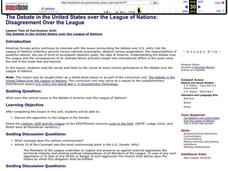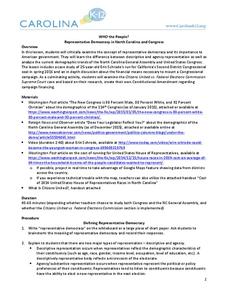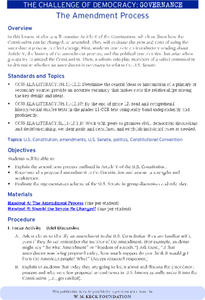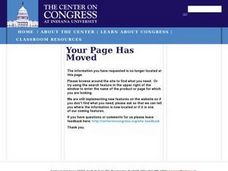Heritage Foundation
The Senate
Do your learners struggle to understand the differences between the Senate and the House of Representatives? Help them develop an understanding of how the US Constitution's clauses affect the Senate's operations. A high-quality social...
iCivics
Mini-Lesson: Filibusters
How long can you speak without stopping? Scholars analyze the concept of a filibuster in the United States Senate using an installment of the Legislative Branch series of mini-lessons. They research recent filibuster attempts in the...
Curated OER
The Debate in the United States over the League of Nations
Students investigate Woodrow Wilson's ideas for peace through the League of Nations. They examine how he attempted to encourage American support for the League and the opposition to it that was found in the Senate.
Curated OER
The Debate in the United States over the League of Nations: Disagreement Over the League
Students examine the opposition of the US Senate to Woodrow Wilson's idea of a League of Nations. They discuss the central ideas involved in the debate over the League.
iCivics
Why Do We Have a House and Senate, Anyway?
Why does the United States have a bicameral voting system? Through role playing as either advocates for or against a cell phone policy in school, your learners will organize, vote, compromise, and experience first-hand the benefits of a...
Street Law
The Challenge of Selecting an Ideal Supreme Court Nominee
Nearly every president has had the opportunity to name a nominee to the United States Supreme Court. But what makes someone an ideal candidate to become a Supreme Court justice? High schoolers test their prior knowledge about the Supreme...
US House of Representatives
Hispanic Congressional Representation in the Era of U.S. Continental Expansion, 1822–1898
From the Louisiana Purchase to the Spanish-American War, the history of the United States is intertwined with the story of Hispanic Americans. Using an article about Hispanics in Congress during the 1800s, learners research their lives...
C-SPAN
How A Bill Becomes A Law
Seven steps are required for a bill to become a United States law. The Families First Coronavirus Response Act (H.R. 6201) is used as a model for the process of how a bill becomes a law. Class members work independently through a Google...
Curated OER
Sizing Up The Senate
Students consider Senate leadership by examining specific positions and staging a mock legislative session. They write reflective essays considering the inner workings of the Senate.
C-SPAN
The Electoral College and the Constitution
What is the purpose of the Electoral College? Is it antiquated, or does it have a place in today's political climate? High schoolers view a series of video clips as they analyze the parts of the United States Constitution that address...
Heritage Foundation
The House of Representatives
The House of Representatives has a lot of responsibility in the United States government. But how did it all begin, and why is it the way it is now? A comprehensive lesson answers all of these questions about the US Constitution and...
iCivics
Mini-Lesson: Presidential Appointments
Can the president of the United States hire anyone he or she wants for any position in the executive branch? The answer may surprise scholars! After investigating the appointment process, historians, by themselves or in pairs, analyze...
Heritage Foundation
Voting and the Constitution
How difficult was it for everyone to get voting rights? Understanding voting rights and the fight to get them for everyone in the United States can be tricky for some learners. However, they are clarified after engaging in the...
Carolina K-12
Who the People? Representative Democracy in North Carolina and Congress
Our elected officials are supposed to represent us, but what does it mean when they aren't like us? Budding citizens explore the demographic makeup of the US Congress, the role of money in political elections, and the Citizens United...
Stanford University
Iraq Resolution
The 9/11 attacks propelled the United States into a period of low-grade war that has existed from that day all the way to current times. By looking at documents from the decision to send troops to Iraq in 2006, scholars connect the...
Curated OER
Regents Review Worksheet #1: Principles of the U.S. Constitution
Kids who take the Regents Exam really need to know a lot of information. This is a wonderful exam review tool that includes 26 pages of questions, charts, and suggested readings to help upper graders pass the test. It focuses on all...
Constitutional Rights Foundation
The Amendment Process
Long revered as the "upper chamber," the US Senate was created to give the new nation a balance between large and small states. However, has the time for this institution passed? Using a reading on how the amendment process works,...
Curated OER
Presidential Powers
Students study and discuss the section of the Constitution that refers to the executive branch. They write a new section or clause describing a new duty for the president of the United States. Students define the word power and proposal.
Curated OER
Balance of Power
Students examine the number of women in the United States Senate. After reading an article, they discover Hillary Clinton's possible bid for the presidential nomination for the Democratic party. In groups, they research the lives and...
Curated OER
What is Meant by Returning to Fundamental Principles?
What did the Founding Fathers mean by the importance of continually returning to fundamental principles? Your young historians will analyze a series of quotations illustrating the fundamental ideals and principles of the United States...
Curated OER
How to Become a Member of Congress
Young scholars identify requirements for becoming a U.S. Representative or a U.S. Senator, explain procedure for running for representative or senator, and create an informational brochure.
iCivics
Congress
Through reading materials, worksheets, and a primary source activity, this resource provides an overview of the structure and powers of the legislative branch of government in the United States. Readings review how a bill becomes a law,...
US House of Representatives
Recent Trends Among Women in Congress, 1977–2006
After reading the contextual essay, "Assembling, Amplifying, and Ascending: Recent Trends Among Women in Congress 1977–2006," groups select a female senator or representative and research her background and contributions.
Curated OER
We Were Here First
Young scholars explore the legal and historical experience of native peoples living in the United States. They write a letter to their United States senator commenting on the Hawaiian bill using information gathered during their research.

























